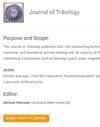基于螺纹优化的行星滚子螺杆机构磨损轮廓建模方法的改进
IF 3
3区 工程技术
Q2 ENGINEERING, MECHANICAL
引用次数: 0
摘要
为了提高行星滚子螺杆机构在不同螺纹几何形状下的抗磨性能,提出了基于矩阵的系统磨损轮廓建模方法和一种新的优化方法。结合螺纹累积磨损产生的轴向间隙,捕捉凸凹接触和凸直接触时螺纹表面的磨损演化特征,为预测PRSM的磨损过程提供了新的视角。结果表明,在105次循环时,凸凹接触的磨损深度比凸直接触浅22%,这表明合理的几何参数可以限制螺纹磨损。进一步分析表明,随着表面粗糙度的增大,真等效压力、塑性应变和最大磨损深度增大。此外,还讨论了表面纹理对螺纹摩擦学性能的影响,以提高所提出方法的适用性。本文章由计算机程序翻译,如有差异,请以英文原文为准。
Improved wear profile modelling of planetary roller screw mechanism with thread optimization
Abstract A systematic process of matrices-based wear profile modeling and a new optimization approach for planetary roller screw mechanism (PRSM) was proposed in this paper to improve the anti-wear performance with varied thread geometries. The wear evolution characteristics of thread surfaces for convex–concave contact and convex–straight contact were captured by incorporating updated axial clearances originated from accumulated thread wear, which provides a new perspective to predict the wear process of PRSM. The results show that the wear depth in convex–concave contact is 22% shallower than convex–straight contact with 105 numbers of cycles, which suggests thread wear can be limited with plausible geometrical parameters. Further analysis showed that as the surface roughness increases, the true equivalent pressure, the plastic strain, and the maximum wear depth become larger. In addition, the effect of the surface textures on the tribological properties of threads is also discussed to improve the applicability of the proposed methodology.
求助全文
通过发布文献求助,成功后即可免费获取论文全文。
去求助
来源期刊
CiteScore
4.20
自引率
12.00%
发文量
117
审稿时长
4.1 months
期刊介绍:
The Journal of Tribology publishes over 100 outstanding technical articles of permanent interest to the tribology community annually and attracts articles by tribologists from around the world. The journal features a mix of experimental, numerical, and theoretical articles dealing with all aspects of the field. In addition to being of interest to engineers and other scientists doing research in the field, the Journal is also of great importance to engineers who design or use mechanical components such as bearings, gears, seals, magnetic recording heads and disks, or prosthetic joints, or who are involved with manufacturing processes.
Scope: Friction and wear; Fluid film lubrication; Elastohydrodynamic lubrication; Surface properties and characterization; Contact mechanics; Magnetic recordings; Tribological systems; Seals; Bearing design and technology; Gears; Metalworking; Lubricants; Artificial joints

 求助内容:
求助内容: 应助结果提醒方式:
应助结果提醒方式:


